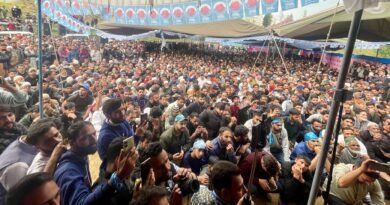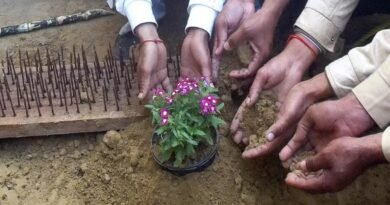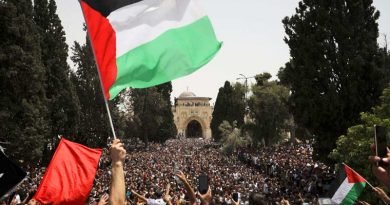Terrorist outfits using technology for radicalisation, moving money from drugs into terror funding: PM
Modi dismisses China’s objections over G20 meeting in Kashmir, AP
India will be developed nation by 2047, economic growth result of stability
NEW DELHI, Sept 4:Terrorist organisations are using technology for radicalisation and capitalising on emerging digital avenues such as the dark net, metaverse and cryptocurrency platforms, Prime Minister Narendra Modi has said while seeking global cooperation to deal with cybercrimes.
In an exclusive interview with PTI, he said the World Bank has estimated that cyber attacks could have caused losses of around USD 5.2 trillion to the world during 2019-2023, but their impact goes beyond just financial aspects into activities that are deeply worrying.
He said these can have social and geopolitical implications.
“Cyber terrorism, online radicalisation, use of networked platforms to move funds from money laundering to drugs and terrorism – are just the tip of the iceberg,” he said.
Modi said cyberspace has introduced an entirely new dimension to the battle against illicit financial activities and terrorism.
“Terrorist organisations are using technology for radicalisation, moving money from money laundering and drugs into terror funding, and capitalising on emerging digital avenues such as the dark net, metaverse, and cryptocurrency platforms to fulfil their nefarious aims,” he said.
Stressing the need for taking the cyber threats very seriously, the Prime Minister said one angle of their adverse impact is the financial losses they cause.
Further, he said, cyber attacks can also have implications for the social fabric of nations.
Modi said the spread of ‘deep fakes’ can cause chaos and loss of credibility of news sources. He said fake news and ‘deep fakes’ can be used to fuel social unrest.
“So, it is of concern to every group, every nation, and every family. That is why we have taken this up as a priority,” he said.
The Prime Minister noted that India hosted a G20 Conference on Crime and Security in the Age of NFTs (Non-Fungible Tokens), Artificial Intelligence and Metaverse in July in Gurugram.
During this conference, he said, concern was expressed over malicious cyber activities contrary to established norms, principles and rules of cyberspace and international law.
Modi said it was stressed that coordination on prevention and mitigation strategies is needed and emphasis was placed on the need to achieve a comprehensive international convention on countering the use of ICTs (Information and Communications Technologies) for criminal purposes.
He said there may be many domains in which global cooperation is desirable but in the domain of cyber security, global cooperation is not only desirable but is inevitable.
Prime Minister Narendra Modi said it is natural for India to hold G20 meetings in every part of its territory as he dismissed Chinese objections over some of the events being organised in Kashmir and Arunachal Pradesh.
As part of its efforts to showcase India’s cultural and regional diversity at a global stage, the Modi Government has hosted G20 events across the country’s length and breadth.
China, a G20 member, and Pakistan, which is not a member of the bloc, had objected to the decision to hold one of the events in Kashmir, which they call “disputed”.
China also disputes India’s sovereignty over Arunachal Pradesh. India has already dismissed claims by China and Pakistan.
“Such a question would be valid if we had refrained from conducting meetings in those venues. Ours is such a vast, beautiful and diverse nation. When G20 meetings are happening, isn’t it natural that meetings will be held in every part of our country,” Modi said.
India held the third G20 working group meeting on tourism for three days from May 22 in Srinagar.
Delegates of all G20 countries, barring China, visited the picturesque Valley for the event.
A large number of delegates had also visited Arunachal Pradesh in March for a G20 event.
Dismissing Chinese claims, India had then said that it is free to hold meetings on its own territory.
By the time India’s G20 presidency term ends, Modi said, over 220 meetings would have taken place across 60 cities in all 28 states and eight Union Territories, and added that over one lakh participants from around 125 nationalities would witness the skills of Indians.
Modi said that India’s economic growth is a “natural by-product” of his nine-year-old government’s political stability, as he expressed optimism that it will be a developed nation by 2047 with “corruption, casteism and communalism” having no place in our national life.
The Prime Minister also stressed on the need for timely and clear communication of policy stance by central banks, and policy actions by each country in their fight against inflation so that it can prevent negative repercussions on others countries.
While most advanced economies are facing an economic slowdown, chronic shortages, high inflation, and ageing populations, the Indian economy is acknowledged to be the fastest-growing large economy with the largest youth population.
“For a long time in world history, India was one of the top economies of the world. Later, due to the impact of colonisation of various kinds, our global footprint was reduced,” he said.
“But now, India is again on the rise. The speed with which we jumped five spots, from the 10th largest economy to the fifth largest in less than a decade has conveyed the fact that India means business,” he noted.
Adding a fourth ‘D’ – development – to the 3Ds of democracy, demography and diversity, he said the period till 2047 is one of huge opportunity and “Indians who are living in this era have a great chance to lay a foundation for growth that will be remembered for the next thousand years.”
India’s USD 3.39 trillion GDP overtook that of the UK in the fiscal year ending March 31, 2022, making it the fifth-largest economy in the world behind the US, China, Japan and Germany.
In the three decades before 2014, Modi said, the country saw many governments that were unstable and therefore, unable to get much done.
“But in the last few years, the people have given a decisive mandate [to BJP], which has led to a stable government, predictable policies and clarity in the overall direction,” he said. “This stability is the reason that over the past nine years, several reforms were brought in.”
These reforms, related to the economy, education, financial sector, banks, digitalisation, welfare, inclusion and social sector, have laid a strong foundation, and “growth is a natural by-product,” he said. The rapid and sustained progress made by India has evoked interest across the world and many countries have been “watching our growth story very closely.”
“They are convinced that this progress is not an accident but is happening as a result of a clear, action-oriented roadmap of ‘Reform, Perform, Transform’,” he said.
“For a long time, India was perceived as a nation of over one billion hungry stomachs. But now, India is being seen as a nation of over one billion aspirational minds, more than two billion skilled hands, and hundreds of millions of young people,” he said.
He noted that India is home to more than 100 unicorns, is the third-largest start-up hub and its space sector’s achievements are being celebrated the world over. India is also breaking all previous records in almost every global sports event and more universities are entering the top rankings of the world year after year, he said.
“With such momentum, I am positive that we will be in the top three economies in the near future,” he said. “By 2047, I am sure that our country will be among the developed countries.”
Modi asserted that the ‘Sabka Saath Sabka Vikas’ model can be the guiding principle for the welfare of a world shifting from a “GDP-centric approach” to a “human-centric one”.
“Irrespective of the size of the GDP, every voice matters,” Modi said.
US President Joe Biden, Japanese Prime Minister Fumio Kishida, British Prime Minister Rishi Sunak, Saudi Arabia’s King Mohammed bin Salman and other leaders will gather at the newly-constructed Bharat Mandapam conference hall on September 9-10 for the pre-eminent annual meeting of developing and developed countries.
“Many positive impacts are coming out of India’s G20 presidency. Some of them are very close to my heart,” Modi said in the 80-minute interview, focused on G20 and related issues, with three senior staff of PTI including Editor-in-Chief Vijay Joshi.
G20 accounts for 85 per cent of the global GDP, 75 per cent of international trade and 65 per cent of the world population. India took over the G-20’s presidency from Indonesia last November, and will hand over to Brazil in December. (PTI)




